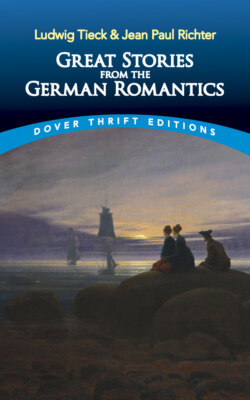Читать книгу Great Stories from the German Romantics - Ludwig Tieck - Страница 5
На сайте Литреса книга снята с продажи.
ОглавлениеNote
LUDWIG TIECK (1773–1853) WAS born in Berlin and learned Greek, Latin, and Italian during his early school years. His later studies included Shakespeare and Elizabethan drama. In his early twenties, he attempted to make his living by writing short stories. He married and settled in Jena, Germany, in 1798, where his writing won the praise of August and Friedrich Schlegel, leading critics of the early Romantic school. Credited as a founding father of the Romantic movement, Tieck is best known for his fantastic stories and novellas. From 1812 to 1817, Tieck combined his earlier stories and dramas in three volumes under the title Phantasus. This collection featured the stories that appear in this edition. In later life, Tieck served as a literary adviser and art critic at the Court Theater in Dresden and edited the translation of Shakespeare by August Schlegel. In 1842 he was invited to Berlin by Friedrich Wilhelm IV, King of Prussia, where he received a pension and would remain until he died as court author in residence. Tieck became the greatest literary authority in Germany after Johann Wolfgang von Goethe.
Johann Paul Friedrich Richter (1763–1825), better known as Jean Paul, was born in Bavaria, and, after a short course of study in theology, devoted himself to the study of literature. Best known for his witty, humorous, and satirical novels and stories, along with his writings on aesthetics, he was one of the first German Romantic writers. Though his influence was great in the early 1800s, he is the least translated into English. It was around the time of Richter’s move to Berlin in 1800 that he met and became friends with August and Friedrich Schlegel, as well as Ludwig Tieck. At this time, Richter had already written Life of Quintus Fixlein (1796) and a considerable number of other works. His work is characterized by wild metaphors and complex plots, causing some literary critics to hold him in highest regard while others view his work with indifference. Among his admirers was the English writer Thomas Carlyle, who has translated the stories in this edition.
